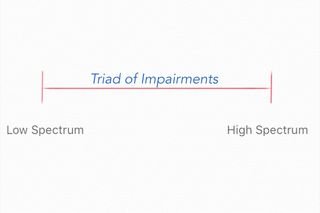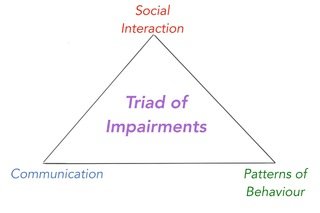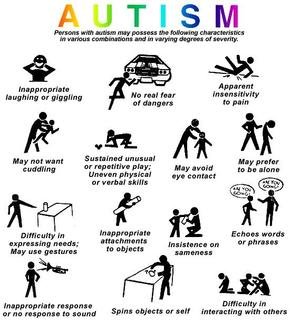Understanding Autism: The Spectrum and Diagnoses.
What is  anyway?
anyway?
 anyway?
anyway?The term autism was first used by a psychiatrist called Bleuler in 1911 to try and describe a type of what was then called ‘childhood schizophrenia’.
So what exactly is Autism? Dr.Damian Milton.
In the 1940’s Kanner and Asperger studied groups of children with ‘childhood schizophrenia’. They found a set of similar symptoms different from the schizophrenia it was thought to be.
Leo Kanner discovered Autism in 1943.
It is a developmental condition although what causes it has yet to be determined (studies lean toward genetics). It is apparent from childhood and continues throughout a person’s life, impacting intellectual, emotional, social, physical or motor skills.
Asperger’s work was discovered in the 70’s lending to the term Asperger’s Syndrome; part of the spectrum but not considered autism per say.

Terminology.
It was referred to as childhood schizophrenia back in the day, and later called childhood autism, autism, Asperger's, Atypical autism and today, the autism spectrum.


How is Autism Diagnosed:
Traditionally, autism is present when a person displays certain patterns of behaviour.
` This doesn’t mean every person with autism behaves similarly.

Autism ‘behaviours’ vary but are usually determined by empathic capacity - how easily the individual relates to others, and uneven cognitive development - some people are skilled in one area significantly more than another. Social communication is a significant challenge.
` This doesn’t mean all poor communicators are Autistic. They are simply better at processing visual information vs verbal information.
Triad of Impairments.
The presence of Autism is determined by the “Triad of Impairments”; Communication, Social Interaction and Patterns of Behaviour.
Communication requires involvement of both parties.
People not on the spectrum - ‘neurotypicals’ - will sometimes have difficulty understanding emotions and cognitive processes of those on the spectrum. While those on spectrum, have trouble understanding neurotypicals. This can lead to a lot of frustration.

Theory of Mind.
Neurotypicals who possess 'theory of mind’ know that others have feelings and thoughts that are separate from ours.
However, some perceive social interactions to be "more complex than simply saying someone passes through intuitive methods to arrive at the idea that others have their own knowledge or feelings."
‘Theory of mind’ is disputed as an explanation of autism by some, "but it is helpful in understanding what we might otherwise perceive as callous indifference."
‘Theory of mind’ is a description of an issue rather than an explanation (Bowler, 2007).

Human interactions work both ways.
Neurotypicals are profoundly gifted at not telling the truth and manipulating others (and themselves!) for their own benefit, but we seldom accuse ourselves of pathological indifference to the welfare of others. Neurotypicals are skilled at ‘morally disengaging’ (or ‘turning down’ their own ‘theory of mind’) with people in distress. Understanding Autism, University of Kent.

Questions on Diagnoses:
There has been no definitive assesment for diagnoses. As result, autism has been called many things in the past and it’s definitions seem to constantly evolve, along with the instruments of assesment. Most diagnosed with Autism also have a coexisting condition (usually ADHD or an intellectual disability).
What if “Autism” is actually symptoms from a preexisting condition?
Is it possible for Autism to be a misdiagnosis of anothers symptoms? Especially since the definitions for what ticks of boxes for “Autism” change so often?

In an interview with Jill Bradshaw, Dr.Damian Milton and Georgine Watts from the Tizard Centre, talked about communication difficulties experienced by neurotypicals and those on the spectrum.

Problems Empathising.
i.e.: A person on the spectrum who is passionate about injustice may yell at the person assumed to have committed the injustice, without realizing their raised voice. The neurotypical perceives the Yeller as being aggressive and this could lead to misunderstanding.
George: “So many times I've had to say don't listen to my tone of voice. I know you're perceiving me as being aggressive or being whatever, but that is not what I mean. Just listen to my words. And I think that's why written communication is often easier for many of us.” University of Kent via FutureLearn

More information:

Did You Know...
- Autism is 4.5 times more likely to affect boys than girls. Read more.
- Autism is a lifelong condition, and so is found in children and older persons.
Follow me @BelleKaur.
Image: 1, 2, 4 - Me, 3 & 6, 5.
Further Reading:
- So what exactly is autism?, Dr.Damian Milton.
- Comic, Rebecca Burgess Redesigns The Autism Spectrum.
- Autism Science Foundation.
- Autism & Safety.
This is interesting. I have two boys at my church who are autistic, but one is "worse" than the other. One can function pretty much normally and the other behaves more like a retarded child. I find that interesting as well, that there is a spectrum of severity. I read that autism is strongly tethered to vitamin D, folic acid and omega-3 deficiency in the parents, as well as parents being older. I hope that more research will yield more results.
The Pscyh community is definitely looking more into autism as awareness increases, although personally I feel more can be done. I often wonder if those on the spectrum are simply more evolved human beings. Who knows? :) also, you mean- higher on the spectrum or intellectually disabled. Mental retardation was removed from the DSM-5 in 2013 if i'm not wrong. That's interesting about deficiencies, perhaps another link to genetics. I'll have to look into that! thanks!
Interesting. I think that they are higher on the spectrum in some respects. It's that concept of if the brain is deficient in one area, it is stronger in another. One of the boys at my church got all A's on his report card, this is the one who is more functional than the other. But the other child, who seems to have a pretty severe case of autism, we heard singing, in tune. His mother always brought him to choir rehearsal with her, and one day we heard him singing one of the songs. It was pretty amazing. Makes us really question what is reality.
Well done!!! My bookkeeper has two sons with autism and showed her your piece. It gave her more insight Keep up the good wok in helping people
This is the video. I found it to be a refreshing, inspirational perspective. <3
Oh! This makes my whole week! Thank you for letting me know! <3
I personally believe people with autism to be more evolved than neurotypicals. they just need lots of love, patience, and time. they are capable of more than we are aware of, I'm sure. It's so hard to think of a world that doesn't understand when you're a parent though. I also just came across this video and will share with you once I watch. Thank you!
Totally true. The definition changed, as well as our ways to diagnose it! Thanks for sharing!
and it constantly changes! lol Oh Psych!
Thanks for dropping by!
Thanks!